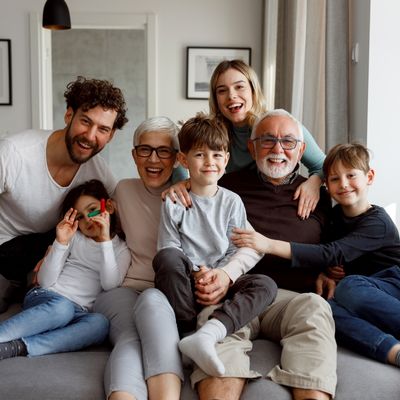Both common, as well as serious vision problems, can be linked to family history. For instance, common problems such as refractive errors can be traced to genetics as well as major vision issues such as glaucoma or cataracts. Knowing your family vision history can help alert your eye doctor to issues you may have as well as those you may develop in the future.
Refractive errors such as nearsightedness and farsightedness can be family-related with similar symptoms and treatments. Color vision deficiency can cause you to not see certain colors, requiring a focus on labeling and patterns. Glaucoma and age-related macular degeneration are two serious vision problems that run in families.
Common Family-Related Eye Problems
Some eye problems are more closely linked to family history than others. This includes refractive errors such as nearsightedness and farsightedness. Other problems such as color vision deficiency and retinitis pigmentosa share a strong correlation with genetics, as well.
Nearsightedness (Myopia)
Also known as myopia, nearsightedness makes it difficult for people to see objects that are far away. This is a common refractive error caused either by the eyeball being too long or the cornea (the outer layer of the eye) being too curved. This makes it so the eye can’t focus correctly on the retina, resulting in distant objects appearing blurry.
Common symptoms of nearsightedness include:
- Squinting
- Eye fatigue
- Headaches
- Eye strain
Children usually have difficulty seeing the board in school. Fortunately, nearsightedness is simple to treat. This can be done with glasses, contact lenses, and LASIK eye surgery if you qualify for the treatment.
Farsightedness (Hyperopia)
Farsightedness is basically the opposite of nearsightedness. Also known as hyperopia, farsighted people can see faraway objects but have difficulty seeing those that are up close. As with nearsightedness, this is due to the light entering your eyes not being focused correctly on your retina. This is due to the eye being either too short or having weak focusing power.
Common symptoms of farsightedness include:
- Difficulty focusing on nearby objects
- Blurry vision
- Fatigue or headache after reading or other close-up tasks
- Eye strain
Like nearsightedness, farsightedness can be corrected with prescription contact and eyeglass lenses. Those who qualify can also undergo LASIK eye surgery to correct their refractive error. If symptoms persist then it may be time to get an eye exam and update your prescription.
Click here to learn what happens during a LASIK procedure!
Color Vision Deficiency
Color vision deficiency prevents you from distinguishing certain shades of color. While it’s more commonly known as color blindness, this isn’t a very good description. That’s because few people who experience it are ever truly color blind. That would be achromatopsia, a much rarer condition that can be inherited, caused by injury, or the result of certain medications.
We are able to see colors thanks to the light-sensitive cones in the retina. Cones contain light-sensitive pigments that recognize different types of wavelengths. This information is sent to the optic nerve and then to the brain where they become the colors that we see. However, cones that are missing certain pigments won’t be able to see all the colors a normal cone would.
Unlike nearsightedness and farsightedness, color vision deficiency cannot be treated with glasses, contacts, or surgery. Instead, the focus will be on organization and patterns. This includes getting help labeling clothing and furniture as well as knowing what order traffic lights are in.
While there is no cure for color vision deficiency, that doesn’t mean those with the condition can’t lead a normal and happy life. They may not be able to pursue some professions, but it’s not a threat to their overall vision. They can adapt to a life with limited color through practice, patience, and time.
To learn the effects of diabetes on your vision, click here!
Glaucoma
Glaucoma affects your vision by damaging the optic nerve. It can occur for a number of reasons with high eye pressure being the most common. It usually comes with no warning signs making regular comprehensive eye exams if it is going to be caught early. This will you give us a chance to provide treatment and reduce or even prevent vision loss before it’s too late.
Glaucoma tends to be genetic so it’s very important to let us know if it runs in your family. If not sure then talk to your relatives. If this is the case then we can take extra precautions with eye exams and other treatments.
Age-Related Macular Degeneration
As the leading cause of major vision loss for adults aged 50 and over, it’s important to get regular eye exams for age-related macular degeneration (AMD). This is especially important if it runs in your family. As with glaucoma, this allows us to know what to look for and catch it early. This helps us to provide treatment early and protect your vision from the effects of AMD.
Symptoms can often go unnoticed in the early stages. Be on the lookout for changes to your vision such as:
- Slowly losing the ability to see objects clearly
- Straight lines appear crooked or wavy
- Empty or dark areas appear in your central vision
- Shapes of objects appear distorted
- Reduced color vision
Do you have a family history of eye problems that may require treatment? Contact us today to schedule your appointment!
Nearsightedness and farsightedness are refractive errors that affect the eye in different ways but have similar symptoms and treatments. Color vision deficiency makes it so that you can’t see certain colors and requires labeling and patterns as treatment. Glaucoma and age-related macular degeneration are two serious vision problems that run in families.
Hardin Valley Eyecare & Optical has been serving Knoxville since 2009. Dr. Travis Thompson and Dr. Catherine Abbott specialize in the diagnosis and treatment of a wide array of eye diseases, conditions, and problems and are committed to improving the quality of life in the Knoxville community through enhanced vision. Located at 10904 Spring Bluff Way, you can schedule an appointment online or give us a call at (865) 888-0892.





